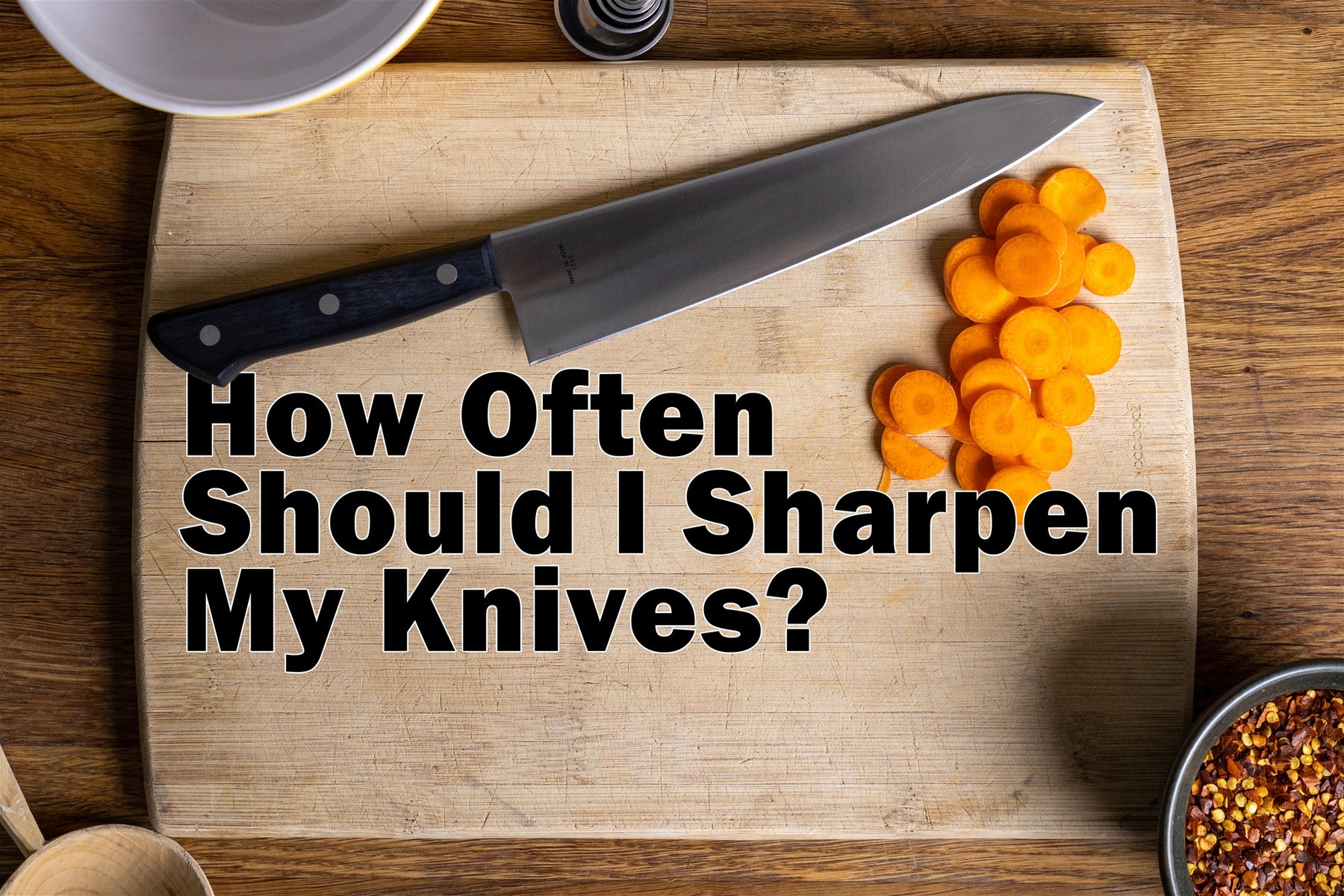How Often Should I Sharpen My Knives?

How Often Should I Sharpen My Knives? A Guide to Keeping Your Kitchen Knives Sharp

At least three or four times a year. Maybe.
Sharp knives make all the difference in the kitchen. A dull blade makes cooking and food preparation tasks more challenging and can even be dangerous.
It can be difficult to know how often you should sharpen your knives to keep them performing at their best. In this article, we will explore the factors that influence the frequency of knife sharpening and offer some tips on how to keep your blades sharp.
Factors That Influence Knife Sharpening Frequency
Nothing in life is ever simple. You might need to sharpen your knife once a month. You might be able to sharpen just once a year. How often you personally need to sharpen your knife depends on the knife and how you’re using it.
Usage
The biggest factor is how often you use your knives. If you use your knives daily, you will need to sharpen them more frequently than if you only use them occasionally. The same goes for if you’re preparing a lot of food for large groups, or just cooking a small dinner for one.
Blade Material
The type of blade material will impact how often you need to sharpen your knives. Harder blades typically hold their edge longer than softer blades. Some knife steels are formulated to be very wear resistant. They will hold an edge for a long time but are more difficult to sharpen.
Type of Cutting Task
The type of cutting task will affect the frequency of sharpening. If you are using your knives for heavy-duty tasks such as chopping through bones, you will need to sharpen them more frequently than if you are using them for lighter tasks such as slicing vegetables.
Edge Geometry
All else being equal, a knife with an acute bevel angle is more susceptible to damage than a knife with a larger bevel angle. Likewise, a knife edge with a hollow grind is more delicate than if it had a convex grind. Knowing what angle your knife bevels are and what kind of grind they have will help you be aware of how often your knife might need sharpening.
For more information on edge geometry, read our article Detailed Discussion on Knife Sharpening Angles.
When to Sharpen Your Knives
Sharpening your kitchen knives is an essential part of cooking. We all understand that after preparing a meal, dishes need to be washed and surfaces have to be cleaned. Maintaining one of the most important tools in your kitchen is just as important. You wouldn't cook with a dirty saucepan, yet many households continue to use blunt knives.
The best way to determine when it's time to sharpen your knives is to pay attention to their performance. Most good knives will dull very gradually, it can be hard to notice a drop in performance. Read our Four Signs Your Knife is Dull article to know what changes to look for in your knife’s performance.
If three or four months have gone by and you haven't sharpened your knives, do so. If you've been using your knives regularly in that time, they'll need it. It's a lot easier to do a little sharpening on knives that are still relatively sharp than to have to spend a lot of time bringing a knife back to sharp when it's become truly dull.
How to Keep Your Knives Sharp for Longer
Sharpening your knives regularly is the foremost way to keep them performing at their best. However, there are other things you can do to extend the time between sharpenings.
Use a Steel or Honing Rod
We recommend having a sharpening steel or honing rod in your kitchen. Use it every time you get your knife out. It’s the quickest and most convenient way to make sure your knives stay sharp for as long as possible.
Store Your Knives Properly
Storing your knives properly can help prevent dulling and damage to the edge. Use a knife block or magnetic knife holder to keep your knives safely stored and protected.
Avoid Hard Materials
Avoid using your knives to cut through hard materials such as bones, frozen foods, or other tough items. These materials can dull your knives quickly and put unnecessary stress on the blade.
Use the Right Cutting Board
Using a cutting board that is too hard, such as stone, glass, or metal, can dull your knives quickly. Get a cutting board made of wood, bamboo, or plastic to help protect your blades.

Bonus tip: don’t use the edge of the knife to scrape food off the cutting board. Flip the knife over and put the spine of the knife in contact with the cutting board to scrape food off.
Final Thoughts
Sharpening your knives is an important part of maintaining their performance and longevity. Pay attention to how your knife is performing and use that to decide when to sharpen your knives. How often you need to sharpen your knives will depend on various factors, such as usage, blade material, and the type of cutting task. By paying attention to your knives' performance and following a few simple tips, you can easily keep your blades sharp and ready for any task.


